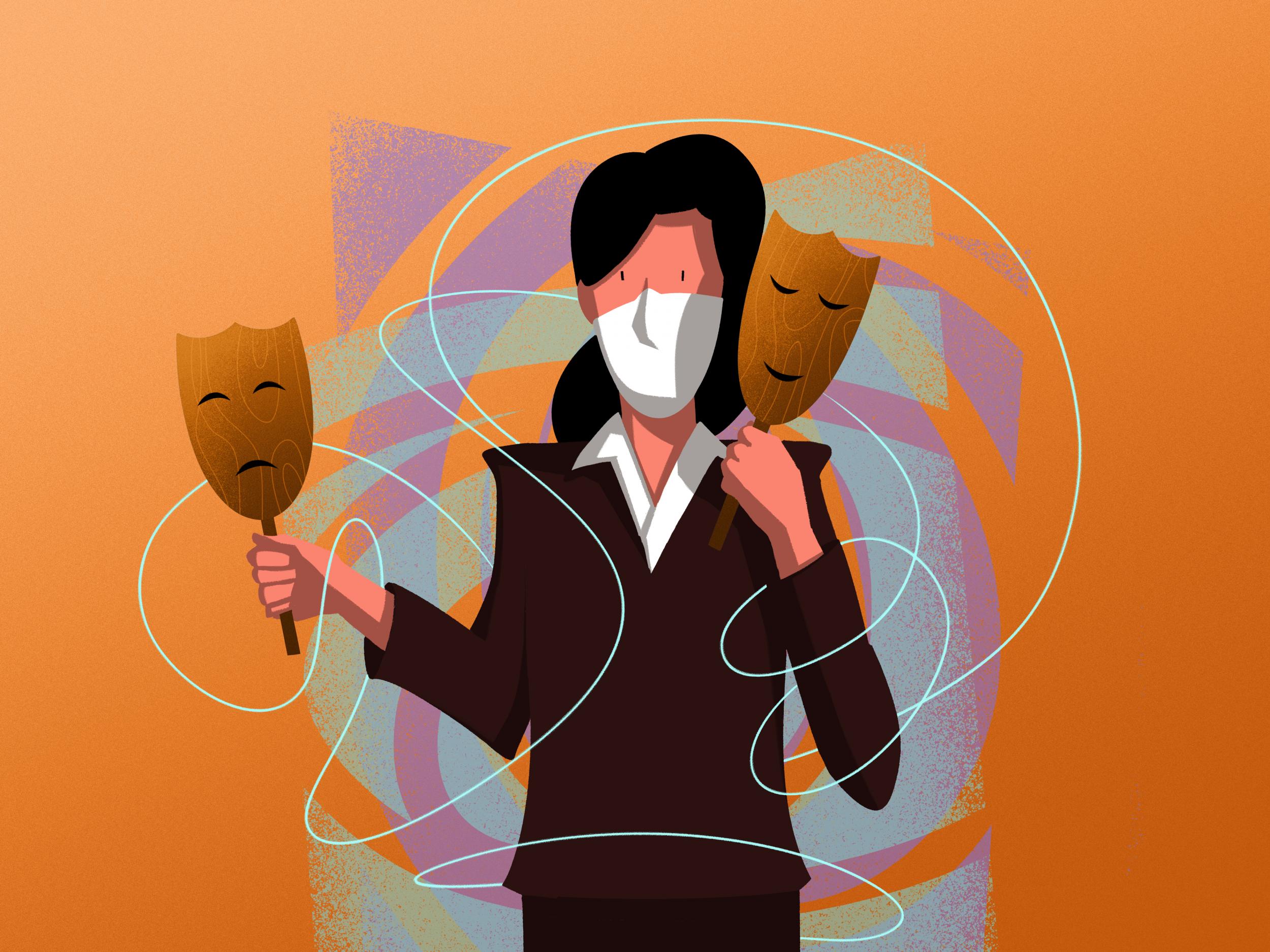Why the art of reading another person has become much harder with masks
There have been unexpected advantages to covering up, writes Christine Manby


Masks. It doesn’t seem that long ago that they were a rarity on public transport in the UK, seen mainly on the Piccadilly Line, gracing the faces of particularly cautious travellers freshly in from Heathrow. They felt like a rebuke, though of course the rationale behind them was actually one of ultimate politeness. “I’m wearing this mask to protect you.” And now they’re everywhere for that very reason. They’re mandatory. And it feels like they’re not going anywhere soon.
At the beginning of lockdown I tried to get hold of some masks. I wanted to send some to Mum, so she might feel confident enough to go out for a walk or to the corner shop. Finding them was impossible. A friend advised that only the sort of weapons-grade masks used by the US army were of any use and they were going for the cost of a small car on eBay. Cheaper masks had delivery dates months hence. In any case, it felt almost rude to wear one of those horrible blue paper things that are now ubiquitous when nurses and care workers were posting videos of themselves crying at the end of their shifts because they didn’t have adequate PPE. Now my local Co-op has five-packs of disposable masks piled high at the tills. One can’t help wondering if government guidance has followed the availability of masks rather than their utility.
Back in April, my neighbour kindly gave me a paper mask from his own supply. Steve Next Door was well-prepared for lockdown. His virologist mother had warned him it was on its way back in January. It’s thanks to Steve’s mum that I put in a huge Ocado order in early February and still have enough toilet rolls to see me through the rest of the year, a no deal Brexit and a nuclear winter.
I took the mask with me to the supermarket – pre 24 July. I didn’t wear it. I put it on only as I knocked on Steve’s door to drop off the treats I’d picked up for his cat. Within seconds, my top lip was sweating and I wanted to cry. My respect for the frontline staff who were fighting for the right to wear the bloody things rocketed. I couldn’t wear a mask for 10 minutes without feeling like I might pass out. They were wearing masks all day. Not having to wear one suddenly felt like a privilege. However, I knew I wouldn’t be able to stay home once masks became mandatory so I experimented with a variety of options. I tried making my own. Anything other than the hideous disposable paper masks felt too heavy. I hate them but then I hate seatbelts too but I wouldn’t drive without one.
It’s not all bad. There have been unexpected advantages to wearing a mask while going from shop to shop. The first is that an ugly sun-spot on my cheek has almost faded away, far more quickly and cheaply than with any of the stupidly expensive face creams I’ve bought before. Wearing a mask also works for this lipstick hater. Now no-one need know I’m only half groomed. Will this period of compulsory mask-wearing lead to an improvement of skin tone that sends the cosmetic companies into a decline? I guess they’ll make extra on eye cream.
But the biggest advantage of masks is that I have finally become inscrutable. I’ve always been more Lucille Ball than Greta Garbo. In real life that means I’ve always been the woman who gets asked for spare change or chatted up by the weirdo on the bus. “You need to change your facial expression,” a friend advised. “You look too nice.” Not so in a mask, it appears.
The received wisdom is that we smile with the eyes but it turns out that we actually take our cue to a person’s mood just as much from the mouth. In the Nineties, Roberta Kestenbaum of the University of Minnesota explored the ways in which we recognise emotion from different parts of the face. She asked her subjects to divine emotions from pictures which showed only the eyes, only the mouth, the mouth and eyes, a face without a nose or a full face. She found that while all participants were better at recognising anger, surprise and fear from the eyes, when it came to happiness, the mouth was more important.
The Alberta study further suggested that people raised in cultures that focus on the eyes may be more skilful at recognising false smiles
More recently, a similar study by researchers from the Universities of Enna, Catania and West London, showed that while fear, sadness and surprise were best recognised from the eyes, we rely greatly on information from the lower part of the face and mouth to recognise happiness, anger and disgust. They found that “neutral” emotion is best represented by the mouth alone.
There are, however, cultural differences to the way we interpret facial expressions that make the mouth much more important in some settings. A 2007 study by the University of Alberta revealed that in cultures where emotional “control” is considered the norm, the eyes are the focus when it comes to interpreting emotions. In cultures where it’s more acceptable to be emotionally expressive, the focus is on the mouth.
The Alberta study compared the United States and Japan, using human images and emoticons. The emoticons say it all. In the US, emoticons vary the symbols used to represent the mouth, while the eyes are always represented by a colon. In Japan, it’s the eyes that change while the mouth is always represented by a straight dash.
Dr Takahiko Masuda, who conducted the study, concluded that, “It is quite interesting and appropriate that a culture that tends to masks its emotions, such as Japan, would focus on a person's eyes when determining emotion, as eyes tend to be quite subtle. In the United States, where overt emotion is quite common, it makes sense to focus on the mouth, which is the most expressive feature on a person's face.”
Perhaps this goes some way to explaining the difference in national reactions to the mandatory wearing of masks in public. It really is harder for some of us to “read” strangers when the bottom halves of their faces are covered.
The Alberta study further suggested that people raised in cultures that focus on the eyes may be more skilful at recognising false smiles. Unlike the chuggers and hopefully chatter-uppers who used to assume I was smiling because I was happy to see them. Through wearing a mask I’ve realised that I smile a lot when I don’t mean it. When I’m not wearing a mask, the set of my mouth is obviously enough to convince strangers that I’m worth asking for a tenner. Now that my fake smile is covered up, I find I’m getting a lot less bother from people I don’t want to be bothered by.
When the compulsory wearing of masks was first mooted, it felt like a further psychological lockdown but, bizarrely, it has set me free. I’m enjoying being harder to read. Which isn’t to say that I won’t be the first to build a bonfire of masks the moment we’re told we no longer have to wear them.
Join our commenting forum
Join thought-provoking conversations, follow other Independent readers and see their replies
0Comments